Black teeth is a dental disorder causing teeth to seem darker than usual, ranging from brown to black. The discolouration is caused by various internal and external sources, affecting a tooth's entire surface or just a portion of the tooth. Black teeth are alarming because they suggest underlying dental or medical problems that need immediate response.
The obvious darkening of teeth is the main sign of black teeth. Other dental problems like pain, tooth sensitivity, bad breath, and an unpleasant taste in the mouth sometimes accompany black teeth. Black teeth are occasionally linked to cavities, tartar accumulation, or underlying tooth rot. More advanced cases show structural damage exacerbating the illness, such as enamel erosion or fissures.
Black teeth are more common in people who practice bad oral hygiene, such as inadequate brushing and flossing. Individuals who eat an excessive amount of staining agents, such as red wine, tea, coffee, or tobacco, are more prone to discolouration. Black teeth are more common in people with specific medical disorders or receiving specific therapies, such as chemotherapy. Children have the potential to acquire black teeth if they have certain hereditary disorders that impair tooth enamel or if they consume excessive amounts of sugary foods and drinks.
Several reasons why teeth get black include inadequate oral hygiene, which leads to the buildup of tartar and plaque and eventual discolouration. Dietary habits, underlying health conditions, medications, and prolonged chemical exposure are other causes of black teeth. Dietary practices, such as ingesting foods and drinks discolour the teeth. Teeth are exposed to tobacco smoke or chewing eventually turns black. Black teeth are the result of underlying medical issues like infections or tooth decay. Some drugs result in tooth darkening, especially bismuth or iron. Tooth discoloration surface due to dental trauma or extended exposure to specific substances.
The underlying source of the discoloration must be addressed to treat a black tooth. Plaque and tartar accumulation are removed by a dentist during a professional dental cleaning, the initial step. Fillings, root canals, or extractions are sometimes required when decay or infection is discovered. The look of teeth is restored through teeth whitening techniques like veneers or bleaching. Treating the underlying medical illness helps improve oral health in patients.
Keeping up with proper dental hygiene procedures prevents the development of black teeth. Plaque accumulation and discolouration are avoided by using mouthwash, daily flossing, and brushing with fluoride toothpaste at least twice daily. Regular dental checkups and cleanings are necessary and, reducing the consumption of staining agents such as tobacco, tea, and coffee the teeth's natural colour. Eating a well-balanced diet, high in fruits and vegetables promotes good tooth health. Drinks that put black on teeth are avoided by using a straw and by washing the mouth out with water afterward. Avoiding overuse of drugs that darken teeth and shielding teeth from damage are two more advantageous practices.

What is Black Teeth?
Black teeth are a dental disorder that occurs when one or more teeth have a darker look ranging from brown to black. Tooth discolouration is an indication of underlying oral or general health problems, affecting a tooth entirely. Black teeth are widely considered to be a dental problem and are associated with poor diet and dental hygiene. Purposeful tooth darkening was known as "ohaguro" during the Heian period (794–1185) in Japan as a criterion of beauty. A modern understanding of the condition of black teeth arose during the 19th and 20th centuries, with developments in dental science. Research identifies darkened teeth as indicators of inherent health issues such as decay, infections, and enamel abnormalities. The development brought attention to how crucial good oral hygiene and routine dental care are to treating and preventing darkened teeth.
Black teeth bring serious psychological and physical effects in today's society. Teeth turning black is a sign of more significant dental issues including cavities, gum disease, or infections that, if addressed, cause tooth loss. The decay, if neglected, progresses and results in infections, abscesses, and potentially systemic health issues if the bacteria gets into the bloodstream. Neglected black teeth lead to foul breath, eating difficulties, and persistent pain that lowers quality of life. They have an impact on one's social interactions and self-esteem, which motivate people to seek cosmetic dentistry. A black tooth is addressed and prevented with various modern dentistry procedures, such as professional cleanings, fillings, root canals, veneers, and teeth whitening, underscoring the significance of upholding proper oral hygiene and scheduling routine dental checkups.
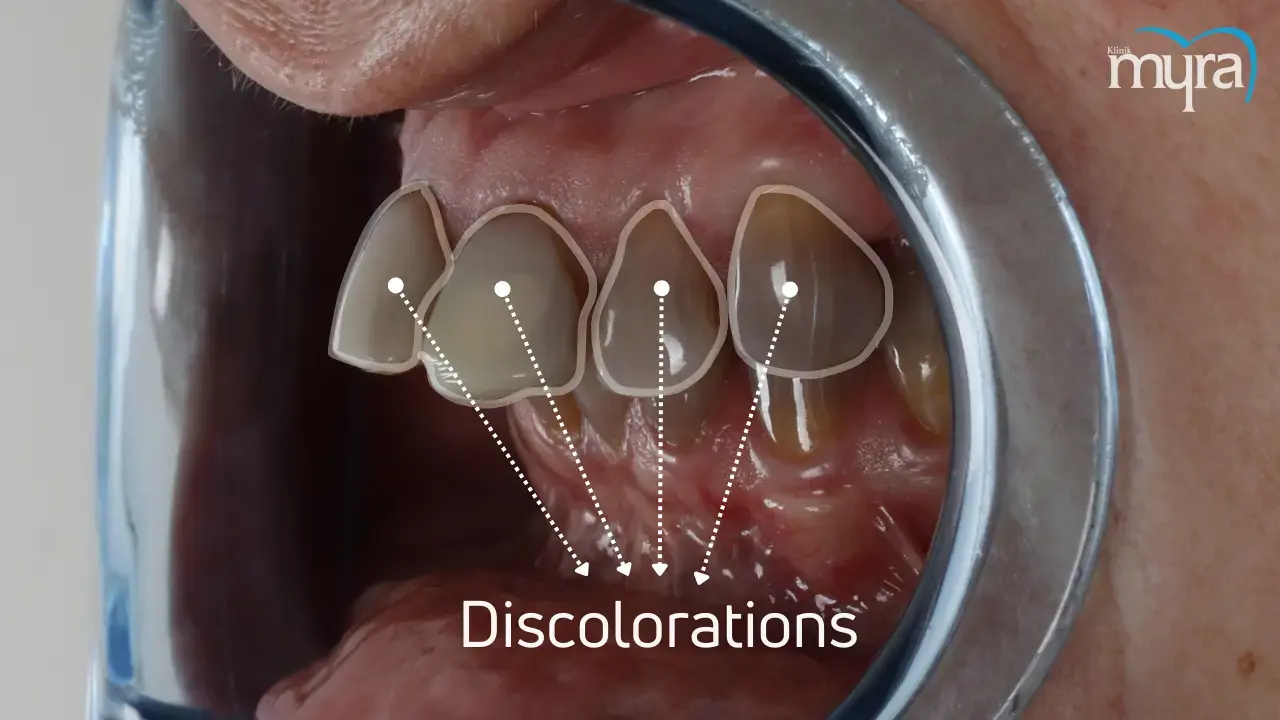
How does Black Teeth Develop?
Black teeth develop gradually through the consumption of discolour-causing substances and oral habits. Patients ask, “Why is my tooth black?” Numerous inherent and extrinsic factors that produce discolouration lead to the development of black teeth. Poor dental hygiene, certain medical disorders, dietary practices, tobacco usage, and medications are contributing factors to the illness. Inadequate brushing and flossing allow plaque to accumulate on the teeth which hardens into tartar and appear black due to staining from food, drinks, and other substances. The black tartar on teeth leads to severe discoloration and gum disease. Consuming foods and beverages with strong pigments, such as coffee, tea, red wine, and cola, contain chromogens, which adhere to the enamel causing black stains on teeth. Acidic foods and drinks erode the enamel, making teeth more susceptible to staining.
Smoking or chewing tobacco is a major risk factor for black teeth because the tar and nicotine in tobacco products cause stains to stick to teeth. Prolonged use causes tartar and black plaque to accumulate, which negatively impacts the look and health of teeth. Internal discolouration results from some medical diseases, such as tooth pulp necrosis brought on by trauma or decay. Black plaque on teeth results from taking medications that include bismuth or iron, such as some liquid supplements and antibiotics. The onset of black teeth begins with superficial black stains, easily eliminated with professional cleaning. Plaque becomes hardened into black tartar if not sufficiently eliminated and becomes more challenging to remove, necessitating dental care from a professional.
Who is at Risk of Developing a Black Tooth?
People who are at risk of developing a black tooth are smokers, consumers of staining food or drinks, medical patients, people taking medications, and individuals with poor oral hygiene. Tooth discolouration and deterioration result from plaque buildup, which becomes hardened into black tartar when brushing and flossing are neglected. Nicotine and tar found in tobacco products stains teeth and promotes the growth of tartar and black plaque. People who regularly drink coffee, tea, red wine, cola, and some foods have a higher risk of developing tooth discoloration. Teeth appear black due to various conditions, including specific infections, tooth decay, and pulp necrosis. Teeth that have congenital enamel abnormalities are prone to become discoloured. Black teeth are avoided by practicing proper oral hygiene, minimizing the use of staining agents, abstaining from tobacco, and scheduling routine dental examinations.
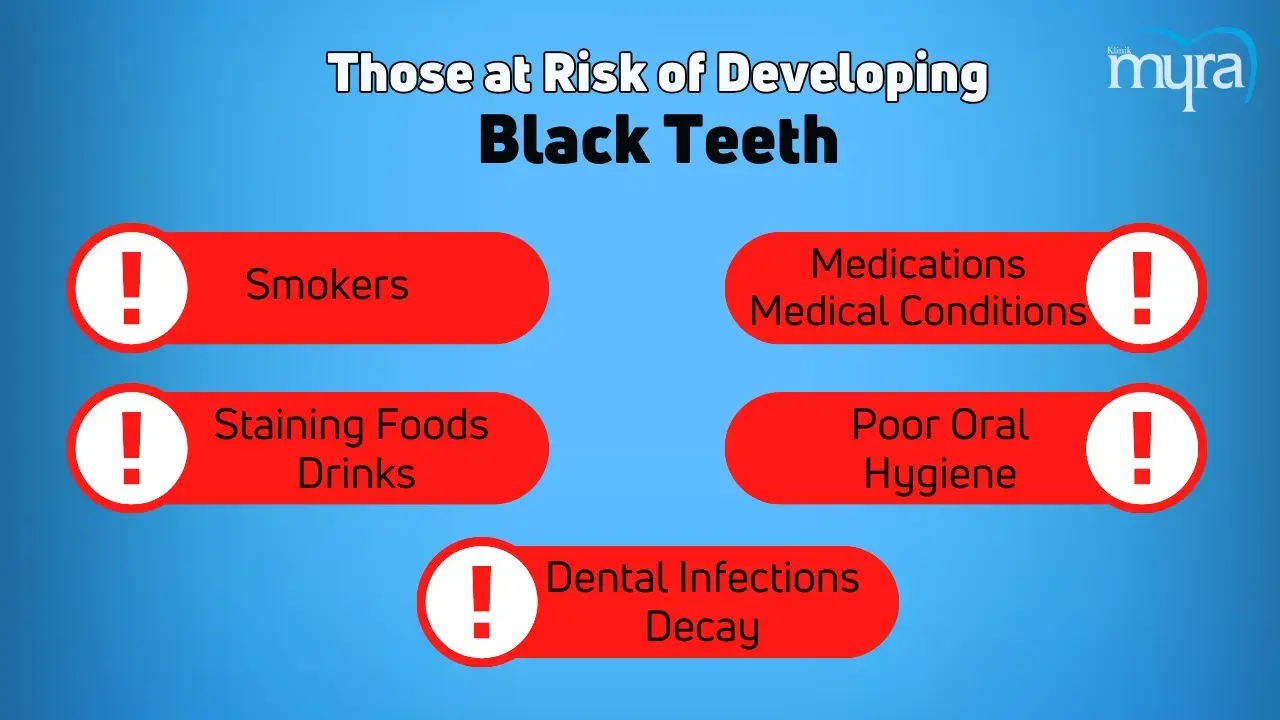
How Common are Black Teeth?
Black teeth are not highly common but people who have certain risk factors such as smoking, poor oral hygiene, severe staining of materials, certain medical disorders, and usage of some medications develop black teeth. Dental darkening is a widespread problem but it has a few precise figures on frequency. Black teeth, a more severe form of tarnishing tooth, are less often seen compared to the more typical yellow or brown stains.
Individuals who don't practice good dental hygiene are prone to have black teeth. A sizable section of the populace disregards recommended dental hygiene practices according to studies, raising the risk of severe plaque and tartar accumulation. For example, a 2019 CDC survey revealed that periodontal disease, leading to the development of black teeth, affects almost 47.2% of persons 30 years of age and older. Tooth Discoloration is reduced through awareness and preventive measures, such as frequent dental checkups and good oral hygiene.
Are Black Teeth Common in Children?
Yes, black teeth are common in children, mostly, a result of external stains. Juvenile tartar, linked to chromogenic bacteria, is a common extrinsic stain source in children's teeth. The kind of discolouration, which doesn't get too bad, happens when specific bacteria start to grow in the mouth immediately after the first teeth erupt. The microorganisms create pigments giving teeth a darkened or black appearance.
One typical cause in young infants is the accumulation of tartar. The mineralization of plaque, dyed by chromogenic bacteria, creates tartar. Certain foods and beverages and poor dental hygiene accelerate the growth of the stains. Children's prescriptions for liquid iron supplements result in dark stains on their teeth. The stains do not implicate serious dental problems and parents must be too concerned about the existence of black stains. The stains are managed and prevented with regular dental cleanings, brushing, and flossing. A dentist offers specialized procedures to guarantee the preservation of proper dental hygiene and eliminate external stains. Extrinsic stains result in black teeth in children, however, the stains are usually not too serious and are easily treated.
What are the Causes of Black Teeth?
The causes of black teeth are listed below.
- Use of Tooth-staining products: Tooth discolouration results from tooth-staining items including toothpaste with strong coloring ingredients or some mouthwashes. The products create a dark stain on the surface of the teeth since they contain substances like chlorhexidine. Consistent use causes obvious black stains, especially in tartar-filled areas and around the gum line.
- Use of specific drugs: Some drugs, such as tetracycline antibiotics, cause intrinsic tooth discoloration when administered to developing teeth. The medications bond to the calcium in teeth, resulting in dark or black pigmentation and challenging to get rid of. Black teeth are treated with veneers or professional whitening procedures since they occur deep within the tooth.
- Consumption of tooth-staining food and drinks: Teeth get darker if certain foods and drinks, such as coffee, tea, red wine, and some berries, are regularly consumed. The products have acids, tannins, and chromogens that taint enamel and give it a blackened look. The staining impact worsens if the foods are consumed without practicing good dental hygiene.
- Dental Repair: Amalgam fillings are one type of dental repair material that gives neighbouring tooth parts a dark or black appearance. The substances erode and seep into the neighboring teeth over time, discoloring the area. The look is lessened by replacing outdated fillings with more recent ones made of tooth-coloured materials.
- Cigarette: Nicotine and tar from cigarettes enter the mouth and stick to teeth, discolouring them darkly. The materials seep into the teeth's porous surfaces, resulting in a persistent black staining that is challenging to remove daily. Improving the visual appeal of stained teeth requires quitting smoking and getting the teeth professionally cleaned.
- Tartar: Plaque that has solidified into tartar builds up on teeth, giving them a rough surface that draws stains. Tartar turns dark or even black when it accumulates, especially at the gum line. Tartar must be removed and kept from seriously tarnishing teeth with frequent dental cleanings.
- Enamel damage: The darker dentin layer underlying the enamel becomes visible due to physical stress or erosion from acidic meals and beverages. A blackened appearance comes from the exposure, particularly if there is significant damage. Tooth colour is preserved by protecting enamel with good dental hygiene and avoiding abrasive materials.
- Tooth decay: Teeth darken and turn black due to tooth decay, caused by bacterial activity in the mouth. Brown or black cavities are caused by decay that has penetrated the teeth's inner layers. The tooth structure is compromised by advanced Tooth Decay, resulting in severe discolouration and the requirement for dental work.
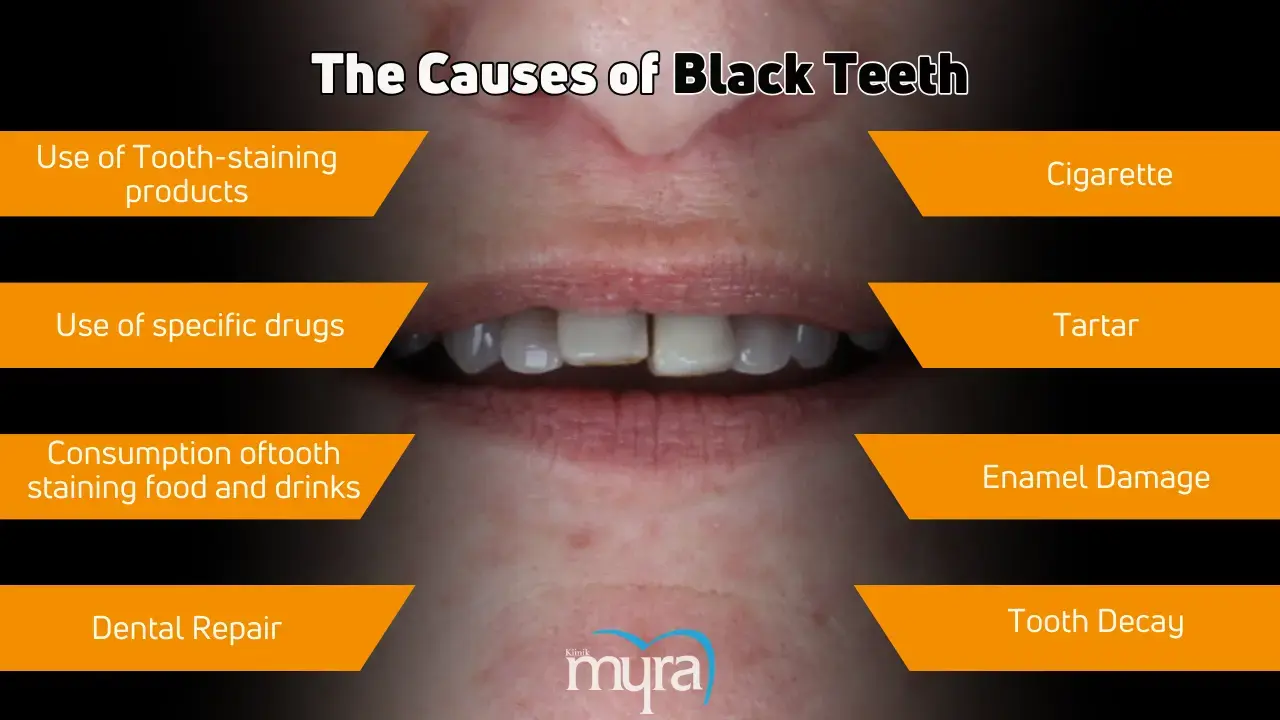
How Long Does it Take for a Tooth to Go Black?
The time it takes for a tooth to go black depends on the root cause, which takes several months to years. Tooth decay involves several phases which begins as a little cavity and grows into a serious condition that turns the tooth black after several months or years. The process is accelerated by bacterial activity and inadequate dental hygiene. Gradual discoloration occurs over months or years of utilizing teeth-staining products or consuming meals and beverages that stain. The extent of exposure and personal oral hygiene habits determine the rate. Teeth darkening results from medications such as tetracycline visible in children during tooth development. The intrinsic staining takes months or even years to occur depending on how long the drug is exposed.
Amalgam fillings gradually discolour neighbouring teeth over several years. The effect darkens gradually as the metal corrodes and seeps into the tooth structure. Teeth become black from smoking cigarettes over months to years, depending on how often and how long one smokes. Tar and nicotine build up on the teeth, causing stains that don't go away. Teeth turn black due to tartar accumulation over several months to years. Plaque turns into tartar without routine dental cleanings, which gradually darkens and draws in stains. Teeth darken faster when there is damage to the enamel that exposes the dentin layer. Teeth-darkening happens within a few months if the damage is severe, while it takes several years when the enamel erosion is slow.
What are the Symptoms of Having a Black Tooth?
The symptoms of having a black tooth are various and indicate underlying dental problems. Leaving a black tooth unattended even if there is no associated pain, is not advisable. The patient must get treatment for a black tooth even without any discomfort because they result in more serious oral health concerns and systemic health problems.
One of the main symptoms is sensitivity when eating and drinking, brought on by cavities or enamel erosion that exposes the tooth's dentin or pulp. The sensitivity to hot, cold, sweet, or acidic meals and beverages varies from slight discomfort to strong, excruciating pain. The emergence of little black specks on the teeth is another early sign, which denotes the start of staining or decay. The dots enlarge and cause more noticeable staining if left untreated.
Black stains on the inside of the front teeth or the exterior of the molars develop as the disease worsens. Tartar accumulation, significant deterioration, and food, alcohol, or tobacco stains are the main causes of the blackening. The enamel breaks down to the point where holes form, revealing the tooth's inner layers. The holes raise the potential of infections and more degradation aside from making the area more sensitive. Holes indicate severe damage to the enamel and necessitate immediate dental care to stop additional degeneration and even tooth loss.
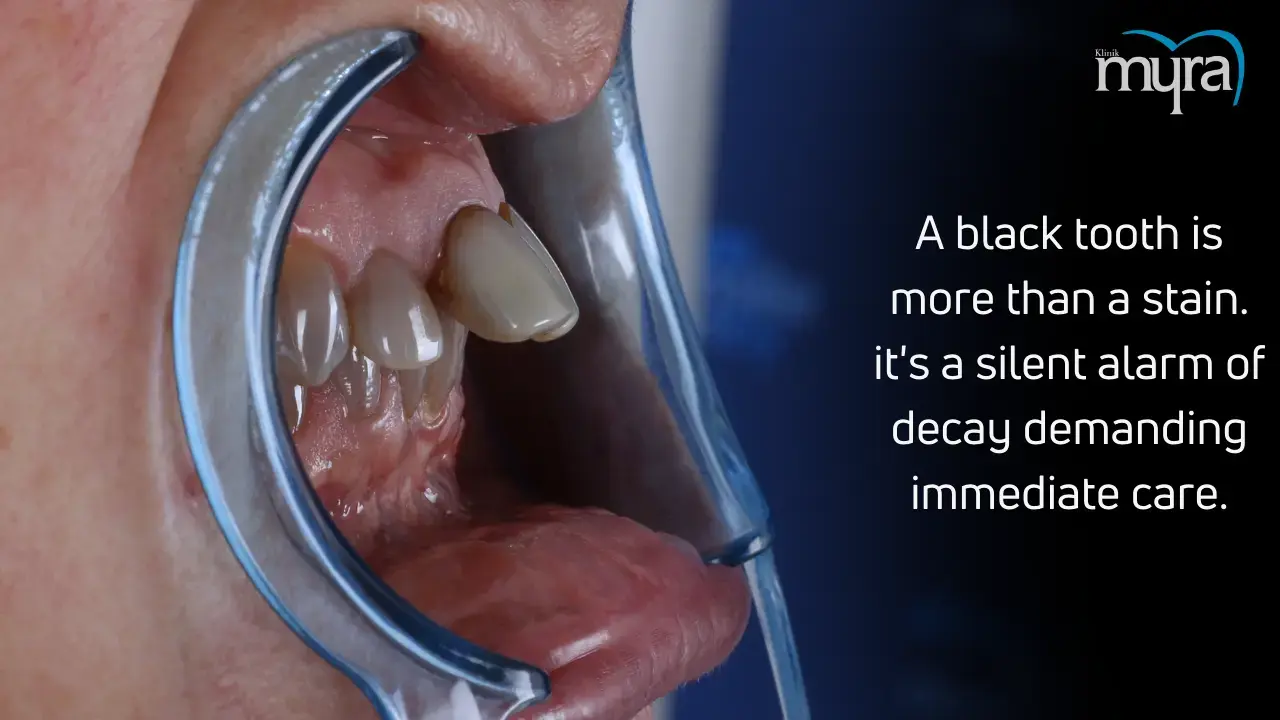
What are the Complications of Having Black Teeth?
The complications of having black teeth are listed below.
- Dental Pulp Damage: Damage to the dental pulp arises from infection or trauma to the tooth's deepest layer, which houses blood vessels and nerves. Prolonged exposure to pathogens, trauma, or profound decay causes the injury. Pulp injury results in necrosis, or the death of tooth tissue, if not addressed immediately, which calls for extraction or root canal therapy.
- Nerve and blood vessel damage: One's capacity to chew and drink comfortably is compromised by acute pain and sensitivity resulting from damage to the nerves and blood vessels inside a tooth. Large-scale dental decay or trauma that pierces the tooth's protective layers causes harm. The tooth eventually dies and infects the surrounding tissues if not treated right away.
- Severe pain surrounding the tooth root: Complications from black teeth include severe discomfort around the tooth root, experienced as a constant throbbing or stinging aching. The pain indicates that the tooth's root and surrounding bone are infected or decayed. Quick dental care is necessary to reduce discomfort and stop other issues like the development of an abscess.
- Gum Inflammation: Bacteria from a decayed tooth travel to the surrounding gum tissue, which causes gum inflammation or gingivitis. Redness, swelling, and bleeding are among the symptoms, especially during brushing or flossing. Gingivitis develops into periodontitis, a more serious kind of gum disease that damages the jawbone and causes tooth loss if left untreated.
- Dental abscess: A dental abscess is a pus-filled pocket that develops as a result of bacterial infection, as a result of untreated gum disease or tooth decay. Severe pain, edema, fever, and an unpleasant taste in the mouth are among the symptoms. Timely dental care is essential because an abscess causes major difficulties if the infection spreads to other regions of the body.
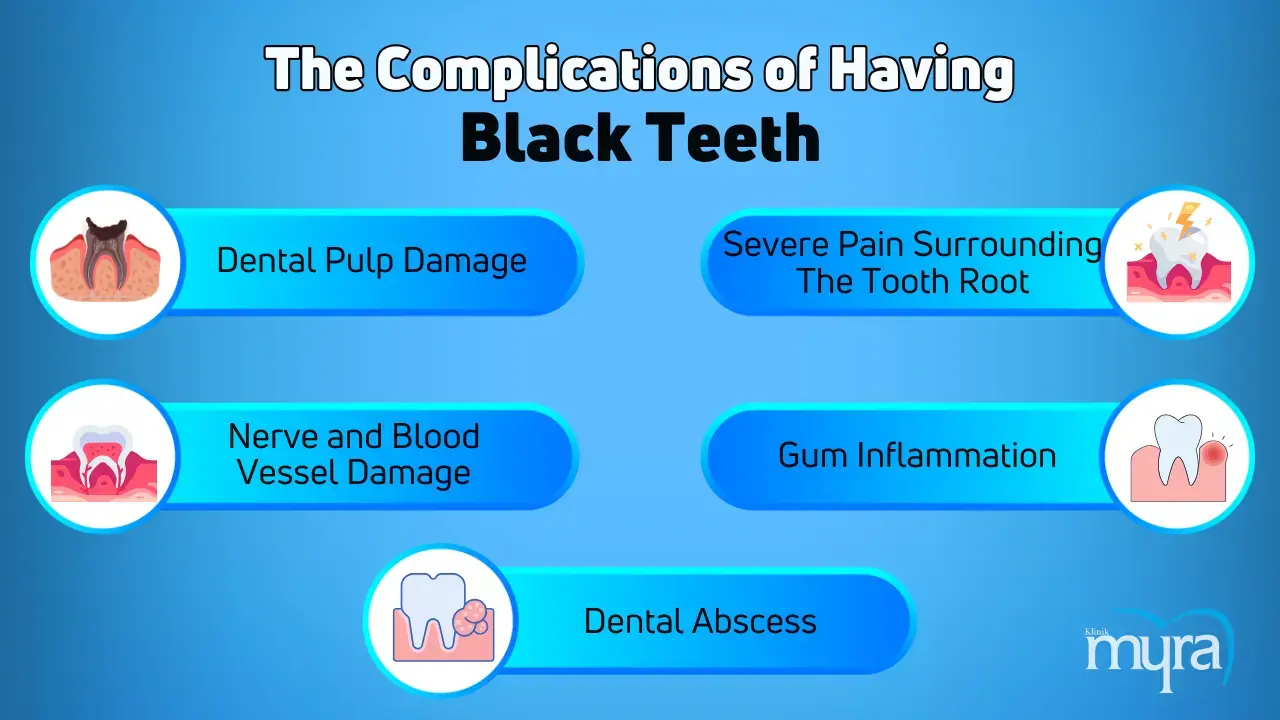
What are the Treatments for Black Teeth?
The treatments for black teeth are listed below.
- Whitening Treatments: Bleaching substances like carbamide or hydrogen peroxide are used to lighten the teeth's colour. The treatments are done in-office by a dentist, alternatively, patients use over-the-counter items or custom-fitted trays at home. Whitening is most effective when it comes to external stains from smoking, food, and drink. It is, however, ineffective for intrinsic staining that originates inside the tooth. "Treatments," in black teeth, are dental operations that address the teeth's discolouration and underlying abnormalities to restore their natural look and function. The procedures vary depending on the degree and underlying cause of the staining.
- Dental Veneers: Dental veneers are thin, precisely fitted shells of composite resin or porcelain attached to the front of teeth. The teeth's general beauty is enhanced and discolouration is well concealed including black stains. Veneers are a durable remedy for other aesthetic problems such as gaps, chipping, and malformed teeth.
- Dental Crowns: Dental crowns are caps used to repair broken or rotting teeth, giving them a new look, strength, and form. They are helpful for excessively discoloured, weak, or structurally challenged teeth. Dental crowns are composed of porcelain, ceramic, or metal. They ensure functional integrity and an improvement in appearance by offering complete coverage and protection.
- Dental Bonding: Dental bonding is a process wherein a resin material that matches the colour of the teeth is applied, moulded, and hardened using a specific light. The treatment provides a reasonably rapid and affordable solution, making it perfect for minor black spots, cracks, or gaps. Bonding significantly improves the tooth's appearance and provides a cosmetic boost, despite being temporary compared to veneers or crowns.
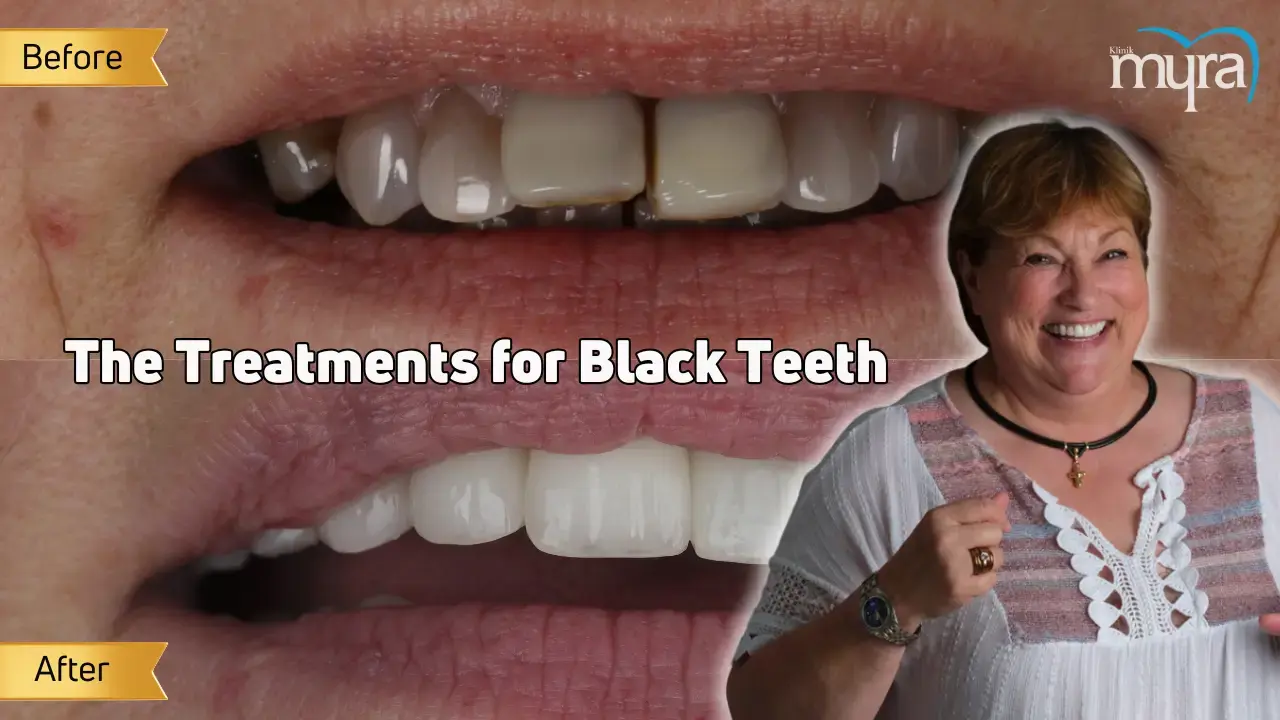
1. Whitening Treatments
The whitening treatments are dental solutions that aim to lighten teeth's colour by eliminating or minimising stains and discolorations. Bleaching agents like hydrogen peroxide or carbamide peroxide are applied during the procedures. The compounds pierce the dental enamel and disintegrate stain molecules.
Black teeth whitening procedures concentrate on eradicating or minimising surface discoloration, and occasionally internal discolouration. The bleaching solutions used in teeth-whitening procedures act by entering the tooth's porous enamel and dissolving the molecules generating the stains. Whitening solutions work wonders for surface-level stains brought on by food, beverages, or tobacco usage. Intrinsic stains, however, are resistant to conventional whitening procedures because they are deeply ingrained in the tooth structure and are caused by trauma, certain drugs, or decay.
The key features of teeth whitening treatments are reduced tooth sensitivity, quick processing times, and many treatment options. A dentist performs in-office whitening procedures that yield immediate, noticeable effects or uses over-the-counter whitening solutions or specially fitted trays to gradually whiten the teeth at home. In-office treatments yield effects in just one hour while at-home treatments take days to weeks. Some individuals have brief episodes of gum irritation or tooth sensitivity during and after the procedure.
Whitening procedures are effective for people with dark teeth if food, drink, or tobacco stains are the cause of the discoloration. The procedures dramatically lighten the teeth look and give them a more natural hue again. Whitening Treatments are sometimes not enough for black teeth caused by innate causes including drug damage, tooth decay, or enamel erosion. Additional dental operations such as bonding, veneers, or crowns are required to attain the desired cosmetic outcome. Speak with a dentist to figure out the best course of action depending on what caused the discolouration.
2. Dental Veneers
Dental veneers are thin, precisely crafted shells intended to cover the front surface of teeth. They are constructed of porcelain or composite resin and cemented onto the teeth to alter their colour, shape, size, or length to enhance their appearance.
Dental veneers cover up discolorations on black teeth by creating a fresh, aesthetically acceptable surface. The dentist first cleanses the tooth by removing small bits of enamel to guarantee a proper fit and to allow the veneer to adhere securely. A dental lab receives an impression of the tooth and uses it to create a personalised veneer. The veneer is attached to the tooth with a unique adhesive when the veneer is completed, which hides the discoloration and gives the tooth a white, natural-looking appearance.
Dental veneers' key features are their adaptability, minimal enamel removal, durability, and improved aesthetics. Composite resin or porcelain is used to make less costly veneers and need less time to apply than porcelain veneers. The fit is accurate and seems natural since each veneer is created specifically to fit each tooth. A composite resin is less invasive because just a small portion of the tooth's enamel is removed. It improves the appearance of teeth by correcting imperfections such as chipping, discolouration, and uneven forms.
Dental veneers are effective black teeth solutions, particularly if the discoloration is caused by internal factors that don't react well to whitening procedures. Veneers completely cover the tooth's front surface, hiding deep stains and giving it a consistent, white appearance. Structurally intact teeth with severe, enduring discolouration from trauma, medicine, or decay benefit from Dental Veneers. Veneers are a great option for treating dark teeth since patients observe a noticeable improvement in the appearance of their smile.
How much is a Dental Veneer in Turkey?
A dental veneer in Turkey costs from $130 to $330 per tooth. The material (composite or porcelain), the dental clinic's standing, and the dentist's level of skill affect the cost. Zirconium veneers cost $220 in Turkey, while porcelain veneers cost $260. Procedures like CELTRA® DUO crown/full veneer, CELTRA® DUO laminate veneer, MyraNatural® crown/full veneer, E.MAX® crown/full veneer, and lumineer range in price from £269 to £340. Turkey is a well-liked location for dental tourism because of its reputation for providing high-quality, reasonably priced dental care. Veneer solutions from Myra Dental Clinic, a reputable dental practice in Antalya, Turkey, are dependable and reasonably priced. Myra Dental's laminate veneers start at £265 and come with a five-year guarantee.
A single dental veneer in the UK costs anywhere from £400 and £1,000 ($500 and $1,300), much higher than in Turkey. The greater overhead expenditures in the UK, such as dentist fees, clinic operating costs, and regulatory requirements, are the reason for the higher costs. Dental veneers cost anywhere from $800 to $2,500 per tooth in the United States. The dentist's experience, the practice's location, and the materials utilised are the variables that affect how much a procedure costs. The use of premium porcelain veneers made by leading dental laboratories is frequently reflected in the higher end of the pricing range.
The quality of care is not compromised by dental veneers being less expensive in Turkey. Modern dental clinics are found all around Turkey, with highly skilled dentists who have received worldwide training. The more economical price structure Dental Veneers in Turkey is influenced by favourable exchange rates and a lower cost of living, making it known as a top dental tourism destination for travellers looking for high-quality dental care at a significantly lower cost than in the UK or the USA.
3. Dental Crowns
Dental crowns are caps placed over the broken or decayed tooth to restore a tooth's strength, appearance, form, and functionality. They provide protection and cosmetic enhancement by completely encasing the visible part of the tooth above the gum line.
Dental crowns enclose the damaged tooth, masking any discoloration and giving the tooth a more natural appearance. The dentist starts the process by cleaning the tooth, removing any decay, and moulding it to fit the crown. The dental lab takes an impression of the tooth, used to create a personalized crown afterward. The prepared tooth is covered and glued to the crown to prevent future harm. It repairs the tooth's strength, function, and look.
The key features of dental crowns include choice of material, longevity, coverage, and visual impact. Porcelain, ceramic, metal, or a mix of the materials are used to create crowns. Crowns made of porcelain and ceramic are often used because of their ability to match colours and look natural. Dental crowns are incredibly strong and, with the right maintenance, they endure up to 15 years. Porcelain crowns offer a compromise between strength and beauty, although metal crowns are typically the strongest. The tooth is shielded against more decay, damage, and discolouration with complete coverage provided by crowns. Crowns are perfect for front and back teeth since they are crafted to precisely match the colour and shape of the original teeth while providing a noticeable visual boost.
Dental crowns are effective for black teeth and work incredibly well, particularly if the discoloration is caused by substantial decay, damage, or inherent staining resistant to whitening procedures. Crowns conceal pigmentation and give a uniform, natural-looking appearance by fully covering the tooth. They provide the benefit of shielding the tooth from future harm and regaining its structural integrity and functionality. Definitely Dental Crowns are a great option for repairing black teeth that need both restorative and cosmetic work.
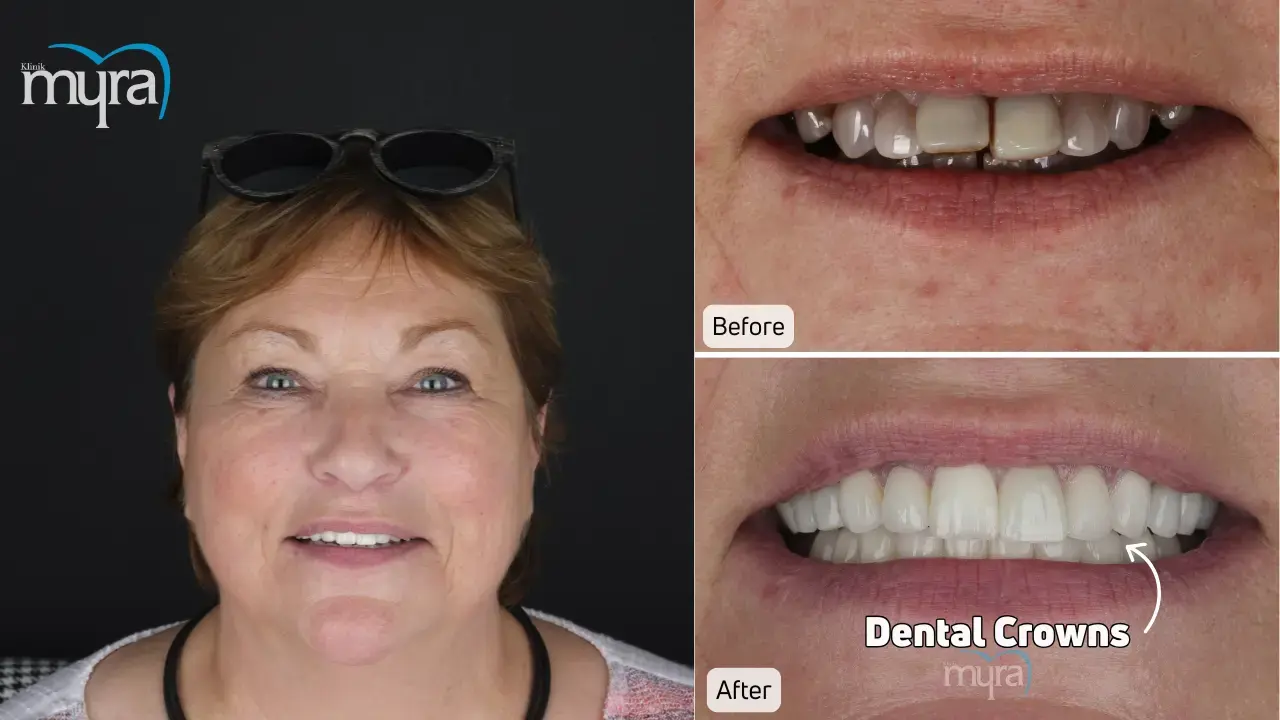
How much is a Dental Crown in Turkey?
A dental crown in Turkey costs from $150 to $400 per tooth depending on the type of dental crowns used in the procedure. Twenty crowns make up a full set of dental crowns in Turkey, which costs £2500 or $3480. The material (ceramic, porcelain, metal, or a mix), the location and reputation of the dental clinic, and the dentist's experience affect the pricing. Turkey is a popular location for dental procedures among foreign patients due to its affordable costs and excellent dental care. A renowned dental practice in Antalya, Turkey called Myra Dental Clinic provides different crown options. A five-year guaranteed porcelain crowns cost £140, zirconium crowns cost £210, E.MAX© crowns cost £265 for each tooth, and CELTRA ® crowns cost £350, at Myra Dental Clinic.
A dental crown sets back between £400 and £1,500 (or between $500 and $1,900) in the UK. Increased operational costs, dentist fees, and regulatory compliance requirements are the causes of the rising costs. Patients' out-of-pocket payments are increased by the fact that dental insurance in the UK just pays a portion of the cost of treatment. A dental crown costs anywhere from $800 to $3,000 in the United States. The type of crown material, the dentist's credentials, the location of the dental office, and the related lab charges for creating the crown have a substantial impact on the price range. High-end supplies and highly skilled dental practitioners are found at the higher end of the pricing range.
Turkey offers special savings on dental crowns, such as 70% less than the UK, USA, or other European countries when paying with cash. Turkey offers affordable dental care, including crowns, due to its low cost of living, good exchange rates, and support from the government for medical tourism. Dental Crowns in Turkey are outfitted with cutting-edge technology and manned by highly skilled dentists, many of whom have studied and trained elsewhere. It guarantees that patients receive top-notch care at reduced rates. Turkey's rapidly developing medical tourism sector provides all-inclusive packages that include lodging and transportation, making it an affordable and practical choice for foreign patients needing dental care.
4. Dental Bonding
Dental bonding is a cosmetic dentistry procedure that repairs tiny flaws in teeth and improves their appearance by applying a tooth-colored resin substance to the tooth's surface. The resin is cured with a specialised light, which improves the tooth's colour, form, and functionality by bonding the material to it.
Dental bonding uses a composite resin that blends in with the natural colour of the teeth to treat discoloured black teeth. The patient's natural tooth colour is the first consideration for the dentist when choosing a resin shade. A conditioning liquid is applied to help the bonding substance stick to the tooth after the tooth surface has been roughened. The resin is applied, moulded, and smoothed to create the required shape. The resin is shaped and polished after being solidified with a curing light to make sure the resin mixes in perfectly with the neighbouring teeth. The procedure restores the tooth's natural look by successfully hiding the black staining.
Dental bonding's key features are its simplicity, speed, and ability to improve appearance. Dental bonding is a less intrusive process than veneers or crowns since it involves minimal removal of tooth enamel. The bonding procedure is finished in 30 to 60 minutes per tooth, in one appointment. Several problems, such as discolouration, chipping, cracks, and spaces between teeth, are resolved with bonding. Several problems, such as discolouration, chipping, cracks, and spaces between teeth, are resolved with bonding. The bonding composite resin is perfectly matched to the tooth's natural colour, resulting in visually attractive and natural teeth.
Dental bonding is effective for black teeth, especially if the discoloration is localised and not the result of significant decay or intrinsic staining that extends deep into the tooth. Dental bonding hides small discolorations or black patches on the tooth's surface. However, other treatments, such as dental veneers or crowns, are more suitable in more severe situations or if the tooth structure is affected. Dental Bonding provides a rapid, affordable, and aesthetically acceptable option for many patients with black teeth, improving their smile with the least intrusion.
Can Black Teeth Be Treated at Home?
No, black teeth cannot be treated at home. Black teeth are an indication of severe dental problems that dentists need to treat. Black teeth result from dental trauma, drugs, tooth decay, tartar accumulation, discoloration, and underlying medical conditions, requiring medical evaluation and care.
Home whitening kits are helpful, but professional treatment is necessary for dark teeth. A precise diagnosis of the condition with professional treatment is required to effectively cure black teeth. Home solutions are less effective than the instruments and procedures that dentists have access to, such as professional-grade whitening chemicals and ultrasonic cleaners. Treatment errors or delays exacerbate the illness. Professional assistance helps to avoid difficulties by ensuring that the issue is handled effectively. Dental professionals offer a comprehensive course of care that addresses the underlying causes of discolouration and the current problem.
Black teeth indicate more serious dental issues requiring a dentist’s attention. Practicing proper oral hygiene at home is crucial for dental health in general. Seeing a dentist for assistance guarantees accurate diagnosis and treatment, stopping more issues and successfully restoring dental health.
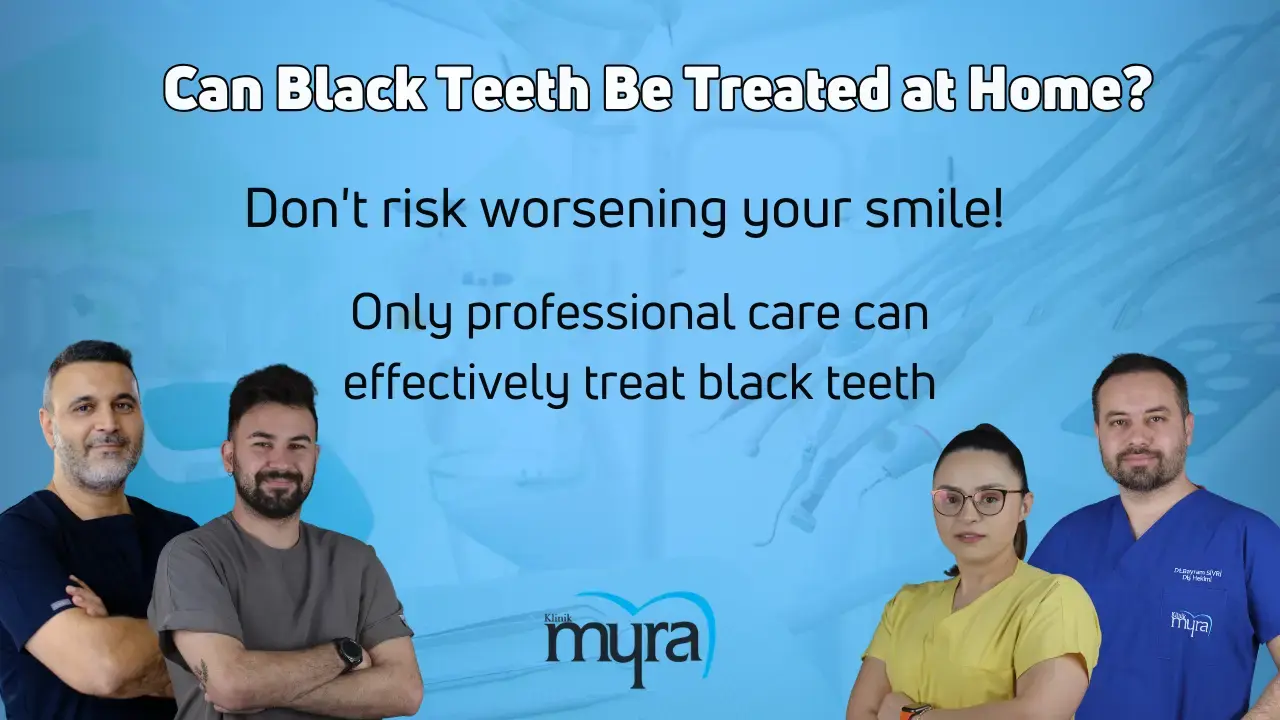
Does Black Teeth Heal on its own in Children?
No, black teeth do heal on their own in children. Children's black teeth indicate underlying dental problems that require medical attention. Medical intervention is necessary to address the issues, and postponing care causes more difficulties.
Poor dental hygiene and sugary diets are the main causes of black teeth in children; untreated tooth disease results in darkened teeth. Tartar-forming plaque in children turns black, especially if dental hygiene is ignored. Specific foods, beverages, or medications leave deep or superficial stains on children's teeth. A dental injury results in pulp necrosis or internal bleeding, which discolour the tooth black, a developmental disorder where teeth are more vulnerable to decay and tarnish due to inadequate enamel. Darkened teeth that have been darkened by genetic illnesses have an impact on the teeth's colour and form.
Black teeth do not recover on their own, even in children, instead, professional dental care is necessary. Dentists use specialised equipment to remove surface stains and tartar. Fillings, crowns, or extractions are potential remedies for dental decay depending on the extent. A root canal is required to preserve the tooth in situations where there is pulp damage or infection. Dentists apply dental sealants, fluoride treatments, and advice on maintaining proper oral hygiene to prevent future problems. Children's black teeth require professional dental examination and treatment because they do not heal on their own. Efficient prevention and management of oral health problems necessitate regular dental examinations and good cleanliness habits.
What are the Best Strategies for Preventing Black Teeth?
The best strategies for preventing black teeth are listed below.
- Floss and brush frequently: Floss once and brush the teeth at least twice daily to remove plaque and food particles. Tartar accumulation and tooth decay, which result in discoloured teeth, are avoided with proper brushing and flossing. The use of fluoride toothpaste improves cavity prevention.
- Avoid consuming stain-causing foods and beverages: Reduce consumption of foods and beverages that discolour the teeth, such as dark berries, red wine, tea, and coffee. The products include chromogens, substances that stick to dental enamel. Lowering the intake keeps their smile more radiant.
- Use a straw to reduce contact with the teeth: Using a straw reduces the amount of liquids that come into direct contact with the teeth and cause stains. The tactic directs the liquid towards the back of the mouth and helps avoid discolouration from beverages such as fruit juices and sodas.
- Quit smoking: Teeth stains and damage are severe consequences of smoking and using other tobacco products. Teeth turn yellow or black due to the nicotine and tar in tobacco. Quitting smoking improves oral health and overall wellness.
- Drink lots of water: Drinking lots of water to stay hydrated aids in removing food particles and germs that cause discoloration and tooth damage. Saliva flow must be maintained to counteract oral acidity, and water aids in the process. Water must be consumed throughout the day and after meals.
- Get a nutritious diet: Ensure kids eat a well-balanced diet full of nutrients, including vitamins and minerals that support strong teeth and gums. Foods high in fibre, such as fruits and vegetables, and high in calcium, such as dairy products, are advantageous. Reducing sugar-filled snacks and beverages lowers the chance of dental decay.
- Consider Education and Supervision: Instruct them in good dental hygiene practices and monitor their brushing and flossing schedules. Promote positive behaviors from an early age to guarantee that they carry them into adulthood. Teaching kids the value of dental care helps them avoid oral health problems in the future.
- Schedule consistent Dental Visits: Early dental problem detection and treatment are achieved by routine six-monthly dental checkups. Professional cleanings get rid of tartar and plaque that routine brushing and flossing do not. Dentists offer customised guidance and preventive care, such as fluoride treatments or sealants.






